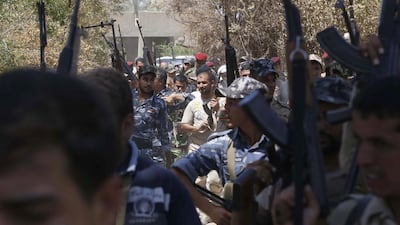BAGHDAD // Militants from the Islamic State have killed at least 500 members of Iraq’s Yazidi minority in northern Iraq, a Baghdad government minister said on Sunday.
Some of the victims were buried alive and hundreds of women kidnapped.
Also on Sunday, United States warplanes and drones pummeled Islamic State militants near Erbil in a fresh wave of air strikes destroying armed trucks and a mortar position, the US military confirmed.
The attacks mark the third day of air strikes launched by the US in an effort to halt the advance of Islamic militants who are threatening Erbil, the capital of the Iraqi Kurdish region.
A Yazidi lawmaker said Sunday at least 20,000 had managed to flee the siege with the help of Kurdish troops and cross into Kurdistan via Syria.
Meanwhile, Iraq’s human rights minister Mohammed Shia Al Sudani said that he had evidence that the Sunni militants had thrown the Yazidi dead into mass graves, adding that some of those buried alive were women and children. About 300 women had been forced into slavery, he said.
Mr Al Sudani said news of killings had come from people who had escaped from nearby Sinjar, the ancient home of the Yazidis and one of the towns captured by the Sunni militants who view the community as “devil worshippers”.
“We have striking evidence obtained from Yazidis fleeing Sinjar and some who escaped death, and also crime scene images that show indisputably that the gangs of the Islamic States have executed at least 500 Yazidis after seizing Sinjar,” Mr Al Sudani said. “Some of the victims, including women and children were buried alive in scattered mass graves in and around Sinjar.”
France joined the calls for Iraq’s feuding leaders to form an inclusive government capable of countering the militants.
“Iraq is in need of a broad unity government, and all Iraqis should feel that they are represented in this government,” foreign minister Laurent Fabius said.
“All Iraqis should feel they are represented to take part in this battle against terrorism,” he told a news conference with his Iraqi counterpart in Baghdad in comments translated into Arabic on state television.
Nearly every day police report kidnappings, bombings and execution-style killings in many cities, towns and villages.
The Islamic State, which sees Shiites as infidels who deserve to be killed, has met little resistance.
The collapse of the Iraqi army prompted Kurds and Shiite militias to step in, with limited success.
The Sunni militants routed Kurds in their latest advance with tanks, artillery, mortars and vehicles seized from fleeing soldiers, calling into question their reputation as fearsome “those who confront death” warriors.
Iranian-trained Shiite militias may stand a better chance than the Kurds but they are accused of kidnapping and killing Sunnis, playing into the hands of the Islamic State, which also controls a large chunk of western Iraq.
After hammering Kurdish forces last week, the militants are just 30 minutes’ drive from Erbil, the Iraqi Kurdish capital, which until now has been spared the sectarian bloodshed that has scarred other parts of Iraq for a decade.
Late on Sunday there was some indication of a change in the battle field as a senior Kurdish military official said his forces retook two towns from the Islamic State. Brig Gen Shirko Fatih the Kurdish fighters were able to push the militants of the Islamic State group out of the villages of Makhmour and Al Gweir.
The retaking of the two towns in Nineveh province is significant because it is the first victory by the Kurdish forces since their initial retreat last week.
* Reuters, Associated Press, and Agence France-Presse

